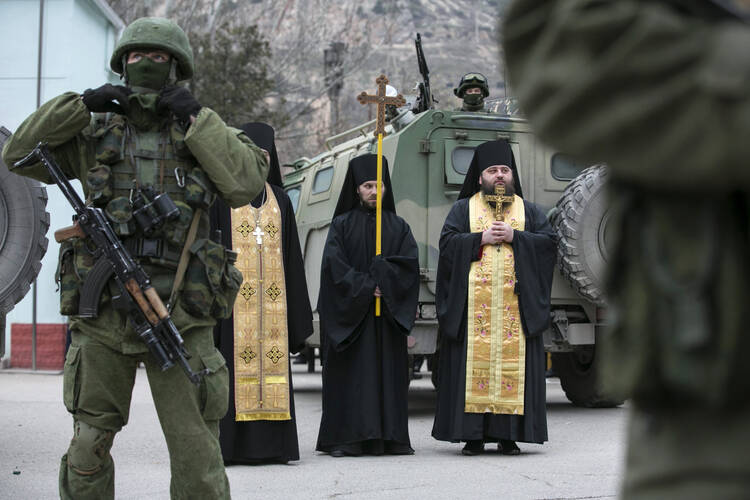A Crimea Peace Campaign
The Russian advance into Crimea raises the unwelcome specter of a revived Cold War and the unpleasant possibilities of an actual “hot” confrontation at the edges of Europe between NATO and a gruesomely reanimated Warsaw Pact. The last time civilizations clashed in Crimea, in the 1850s, the Christian churches did not acquit themselves well. In fact, Catholic and Orthodox leaders provided the excuse for imperial maneuvers in what began as a petty dispute over control of sites in the Holy Land.
Some of the same chauvinistic chest-thumping is being revived in this 21st-century dispute. The Ukrainian Greek Catholic Church is urging Europe to rouse itself to stand off the Russian bear bellowing at its doorstep. Russian separatists have scattered across eastern Ukraine seeking to concoct an incident that could hurtle Europe and the United States back into the 19th century—this time with nuclear weapons and drone patrols instead of sabers and cavalry charges. This modern charge could be turned back if Christians from both sides of the political and cultural border put aside the past, abandon ancient suspicions and work together to reduce tensions.
There is reason to be hopeful. The Kremlin’s own pollster found on March 3 that the Crimea intervention is deeply unpopular. Despite phrasing designed to produce a positive response and days of bombastic propaganda, the survey found that 73 percent of the Russian people are unhappy with Putin’s land grab. Though recent statements from an Orthodox spokesperson are not encouraging, perhaps the Orthodox and Catholic churches can seize on that popular sentiment to forestall a greater disaster. A vigorous joint campaign for peace now would make a small recompense for their role in the previous imperial tragedy in Crimea.
A Road Map to Nowhere?
Hours before a meeting on March 3 between Prime Minister Benjamin Netanyahu of Israel and President Obama at the White House, Israel’s Central Bureau of Statistics revealed that Israel began construction on twice as many homes in the West Bank in 2013 than in the previous year. More than 550,000 Israelis now live in the West Bank and East Jerusalem in settlements deemed illegal by the international community. Even as it participates in a dialogue presumably aimed at finalizing a two-state solution, the Netanyahu government remains firmly committed to a settler program that explicitly undermines those negotiations.
The United States should consider a dignified withdrawal from this geopolitical theater. If the Obama administration truly believes that Israel must accept a two-state solution or set itself on a path to an apartheid state, then it must be willing not just to make threats but to actually cut off the economic and military aid that undergirds Israel’s West Bank expansion.
At the annual American Israel Public Affairs Committee conference in Washington on March 4, Mr. Netanyahu sought to discredit a growing worldwide boycott, divestment and sanctions movement against Israel as a new variant of the ancient sin of anti-Semitism. He may continue to fulminate this way, but the effectiveness of that indictment is diminished by each rising settler condo building in “greater Israel.” Just as another generation began a global disinvestment campaign against the apartheid government in South Africa, young people today are gathering in the B.D.S. movement to challenge elders trapped in suspicions and postures of the past. Maybe this activist army can achieve what has eluded legions of professional diplomats for decades. Maybe it can push Palestinians and Israelis together for a real negotiation of the future, and the land, that they share.
Popes and Sainthood
Giovanni Battista Montini (1897-1978)—better known as Pope Paul VI—is one step closer to beatification following attribution to him of a miracle on behalf of a pregnant woman in the early 1990s. The mother was told that serious health problems with her fetus would likely result in brain damage, and she was advised to terminate her pregnancy. She refused. Instead, she prayed for the pope’s intercession, and eventually the child was born healthy and continues to thrive. The Congregation for the Causes of Saints has approved this miracle and, pending review and approval by Pope Francis, Pope Paul will be beatified.
After the death of Pope John XXIII, Paul VI continued and brought to a conclusion the Second Vatican Council, and he steered the church through a difficult period afterward. His immediate successor, John Paul I, is also under consideration for sainthood.
It is interesting—and disconcerting to some—that so many popes of recent memory are being considered for the “honors of the altar.” Though popes are expected to be saintly, that does not mean all popes should be formally recognized as saints. The process of canonization is beautiful and oftentimes complex. “How inscrutable are God’s judgments and how unsearchable his ways!” (Rom 11:33).








